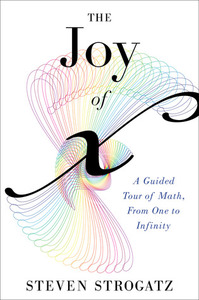Take a photo of a barcode or cover
I think that Strogatz does a great job of explaining complex ideas in either visual or relatable terms. Some of the concepts didn't lend themselves to be very colorful, which kind of lost me on those topics (like the idea that there are many different 'shortest' avenues around a cylinder). However, that can hardly be the fault of the author. Overall, it was fun and definitely rekindled a lot of interest I had in these topics from school. If you have an interest in the large concepts that math can bring in, I'd say this is a very fun and very high level view on that broad topic of math.
In these 30 short essays--a couple of which I had read before in his Time column--Strogatz begins at the beginning (with the concept of counting) and winds his way through everything from basic algebra to calculus to advanced topics like group theory and topology, discussing each topic in a way that is not only friendly and approachable for the mathematical neophite (or phobic), but fascinating. And for all that the book is aimed at a general audience, I have to admit that I learned a few fascinating things about some topics that I didn't even learn in my advanced semester-long college classes. (Did you know there are real-world applications from infinite series? I didn't!)
So yes, this is a book about math, but it isn't just for math lovers. In fact, it's probably more for people who felt like they "never really got it" in school but are maybe just a little intrigued and kind of want another crack at it (in a way that doesn't involve doing homework). I also think it makes a GREAT resource for math teachers. (I used the two calculus essays as introductions to each semester of the course, differential & integral respectively. They give a really great, 30,000 ft overview that I thought might help the students see what it was we were really doing and why before we got bogged down in problem sets.)





